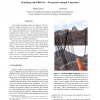Free Online Productivity Tools
i2Speak
i2Symbol
i2OCR
iTex2Img
iWeb2Print
iWeb2Shot
i2Type
iPdf2Split
iPdf2Merge
i2Bopomofo
i2Arabic
i2Style
i2Image
i2PDF
iLatex2Rtf
Sci2ools
106
click to vote
CVPR
2005
IEEE
2005
IEEE
Matching with PROSAC - Progressive Sample Consensus
A new robust matching method is proposed. The Progressive Sample Consensus (PROSAC) algorithm exploits the linear ordering defined on the set of correspondences by a similarity function used in establishing tentative correspondences. Unlike RANSAC, which treats all correspondences equally and draws random samples uniformly from the full set, PROSAC samples are drawn from progressively larger sets of top-ranked correspondences. Under the mild assumption that the similarity measure predicts correctness of a match better than random guessing, we show that PROSAC achieves large computational savings. Experiments demonstrate it is often significantly faster (up to more than hundred times) than RANSAC. For the derived size of the sampled set of correspondences as a function of the number of samples already drawn, PROSAC converges towards RANSAC in the worst case. The power of the method is demonstrated on widebaseline matching problems.
Computer Vision | CVPR 2005 | Measure Predicts Correctness | Robust Matching Method | Similarity Function | Tentative Correspondences | Top-ranked Correspondences |
Related Content
| Added | 12 Oct 2009 |
| Updated | 12 Oct 2009 |
| Type | Conference |
| Year | 2005 |
| Where | CVPR |
| Authors | Ondrej Chum, Jiri Matas |
Comments (0)

